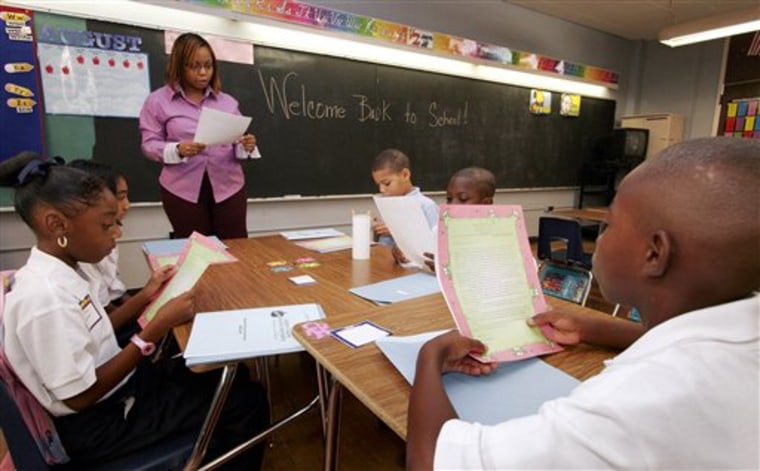Carrying a heavy book sack on his shoulders, 12-year-old Jermaine Gibson wasn’t complaining a bit about the first day of classes Monday.
“The summer was boring. There was nothing to do. I’m glad to be back,” he said as he arrived at William J. Fischer Charter Elementary School.
Fischer, one of the city’s low-performing schools before Hurricane Katrina, was among eight public schools that reopened Monday, giving more than 4,000 students an early start on the school year and advancing a reform movement that blossomed after the storm devastated the city almost a year ago.
A uniformed sailor from a nearby Navy support station blew “Reveille” on his trumpet near the school entrance as students and parents walked down freshly painted hallways adorned with colorful murals and saw the new computer lab.
More than 40 other public schools are scheduled to open by mid-September for an estimated 30,000 students in what is planned as a rebirth of one of the nation’s worst school systems, which had about 60,000 students before the storm.
Classes were small Monday, with only about a dozen or fewer students in each, but Fischer spokesman David Grubb said he expects enrollment to climb in coming weeks.
“Some people just haven’t come back yet,” he said, of those who have not returned since the hurricane.
Some new flooding
Potential problems abound for the school system. On Friday, for instance, state officials announced that one school won’t meet its target opening date of Sept. 7 because of flooding caused by recent rainfall. Opening dates for several other schools are in question and state officials have acknowledged difficulties in finding enough teachers.
Understanding who runs each school almost requires a scorecard: A handful remain under the authority of the troubled Orleans Parish School Board. The board has voluntarily allowed some schools to be run as charter schools, which receive public money but operate independently. And it has been relieved of authority over more than 100 schools by the state Department of Education, which is running some of them itself and chartering others.
The various schools and governing entities also mean a variety of registration and starting dates — a source of confusion for parents.
There are no geographic requirements in the revamped system. Any student, living anywhere in the city, can register for any school on a first-come, first-served basis or by lottery, placing schools in competition for students and state funding, which is based on attendance.
Union concerns
United Teachers of New Orleans criticized the disorganization, and called for one central system to enroll students, hire teachers and other employees, distribute textbooks and get chairs and desks to schools.
“The confusion facing public education in New Orleans at the start of the new school year is deeply troubling,” union president Brenda Mitchell said. “After months of promises that the new New Orleans school system will be a model for the country, the state is debuting an utterly chaotic and dysfunctional system.”
Leslie Jacobs, a member of the state Board of Elementary and Secondary Education, acknowledged there were still some problems but said she was thrilled with the transformation in the city’s schools.
“This is huge,” she said. “What’s happening in New Orleans is turning into a national model on choice.”
